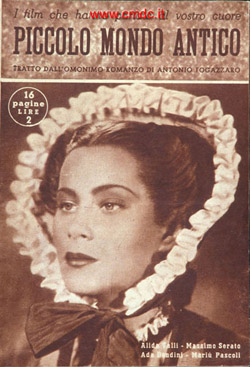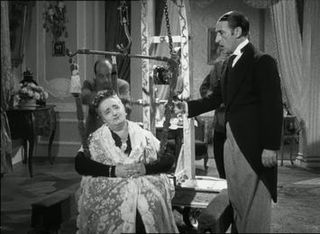
Don Camillo and Peppone are the fictional protagonists of a series of works by the Italian writer and journalist Giovannino Guareschi set in what Guareschi refers to as the "small world" of rural Italy after World War II. Most of the Don Camillo stories came out in the weekly magazine Candido, founded by Guareschi with Giovanni Mosca. These "Little World" stories amounted to 347 in total and were put together and published in eight books, only the first three of which were published when Guareschi was still alive.
This article contains information about the literary events and publications of 1895.

Antonio Fogazzaro was an Italian novelist and proponent of Liberal Catholicism. He was nominated for the Nobel Prize in Literature seven times.

Mario Alberto Lattuada was an Italian film director.

Valsolda is a comune (municipality) of about 1,400 inhabitants in the Province of Como in the Italian region Lombardy on the border with Switzerland. It is located about 60 kilometres (37 mi) north of Milan, about 25 kilometres (16 mi) north of Como and 2 kilometres (1.2 mi) east of Lugano.

Massimo Serato was an Italian film actor with a career spanning over 40 years.

Mario Soldati was an Italian writer and film director. In 1954, he won the Strega Prize for Lettere da Capri. He directed several works adapted from novels, and worked with leading Italian actresses, such as Sophia Loren and Gina Lollobrigida.

Piccolo mondo antico, known in English as Old-Fashioned World , is a 1941 Italian drama film directed by Mario Soldati and based on the 1895 novel by Antonio Fogazzaro. It belongs to the movies of the calligrafismo style.

Gaspare "Kaspar" Capparoni is an Italian actor.

Ada Dondini was an Italian film actress. She appeared in 48 films between 1916 and 1954.

Enzo Biliotti was an Italian film actor. He appeared in 80 films between 1916 and 1958.
Salvator Gotta was an Italian writer. He was best known as a prolific novelist, but he was also a biographer, playwright, screenplay writer, and writer of children's books.
Lux Film was an Italian film distribution company founded by Riccardo Gualino in 1934.

Malombra is an 1881 novel by the Italian writer Antonio Fogazzaro. It is a Gothic story set close to Lake Como in the mid-Nineteenth century. It was Fogazzaro's debut novel.
Daniele Cortis is an 1885 novel by the Italian writer Antonio Fogazzaro. The plot follows the impossible love between Daniele Cortis, an idealistic Catholic politician, and his cousin Elena, married to a man who does not understand her.

Annibale Betrone was an Italian stage and film actor, and film, theatre and radio director.
Il Santo is an Italian novel written by Antonio Fogazzaro and published by Baldini & Castoldi in 1905 in Milan. The novel is the third and last of a trilogy in which Piccolo Mondo Antico is the first and Piccolo Mondo Moderno is the second. Despite the fact that Fogazzaro was a devout and loyal Catholic, Il Santo was listed on the Index Librorum Prohibitorum. The Vatican's prohibition of this novel helped Fogazzaro achieve a worldwide reputation.

Calligrafismo is an Italian style of filmmaking relating to some films made in Italy in the first half of the 1940s and endowed with an expressive complexity that isolates them from the general context. Calligrafismo is in a sharp contrast to Telefoni Bianchi-American style comedies and is rather artistic, highly formalistic, expressive in complexity and deals mainly with contemporary literary material, above all the pieces of Italian realism from authors like Corrado Alvaro, Ennio Flaiano, Emilio Cecchi, Francesco Pasinetti, Vitaliano Brancati, Mario Bonfantini and Umberto Barbaro.
This is a list of Italian television related events from 1956.
This is a list of Italian television related events from 1983.













